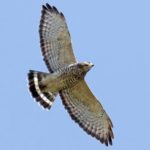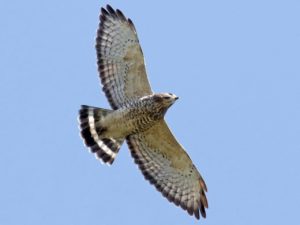
By Meg Muckenhoupt
The only constant in life is change, according to Heraclitus, the Greek philosopher who strolled through Ephesus in the late sixth century B.C.E. The Greek letter most commonly used to represent change is delta, which is also the title of the variant of the coronavirus that is more contagious than previous versions and has persuaded the town of Belmont to mandate indoor masking.
So, instead of posting a page of fall walks, fundraising galas, hands-on classes, film screenings, talks, and volunteer opportunities, the Belmont Citizens Forum Newsletter’s event listings once again offer the thin milk of online programming. I am sorry it has come to this.
Some changes are thrilling. Raptors migrate through Massachusetts in September each year on their way to their winter lairs. Millions of hawks pass through the state, forming circular “kettles” of dozens or hundreds of birds whirling high in the sky. It’s easiest to see them from the tops of short mountains like Mount Wachusett, but they’ve been known to pass by suburban hills as well.
Learn to spot, identify, and appreciate these birds with Mass Audubon’s Identifying Hawks in Flight (bit.ly/BCF-Hawks-921) program on Thursday, September 9, 7–8:30 PM. Mass Audubon members $20, nonmembers $24. Mass Audubon states: ”Every autumn millions of hawks migrate south, providing the best opportunities to see them in flight. However, identifying hawks in flight is very different from seeing them close-up in photos. This online presentation will introduce you to the 11 most commonly seen hawks in New England, providing the keys and a few tricks for you to begin identifying them at a distance on your own. By the end of the course, you’ll know where and when to look for them, and how to identify what you find.”
This season will also shift Bay State Bike Month (www.baystatebikemonth.org), a series of events supporting Massachusetts bicycling and bicyclists that’s usually held in May. This year, it’s September. As of press time, there aren’t many events listed near Boston, but perhaps that will change.
You can bring about a change in your environment, and perhaps your soul, via the Mystic River Watershed’s Reverse Tashlich (Mysticriver.org/reverse-tashlich). This is a trash-clearing twist on a Jewish tradition. As the Mystic River Watershed Association writes, “In addition to throwing sins into a body of water, as is customary for the High Holidays in September, we would like to promote a ‘Reverse Tashlich’ where people improve their local watershed by removing trash. From September 9 through the 16, we are asking small groups and family members to remove litter from the Mystic River watershed . . . . By cleaning up your local watershed, you not only benefit your community—you also help prevent this litter from going downstream and ultimately ending up in the ocean.” Register and report your physical and spiritual progress at Mysticriver.org/reverse-tashlich.
For longer-term environmental change, you can learn to identify the invasive plants that are ravaging our local ecosystems, so you can choose your weeding battles. The Native Plant Trust is actually offering a hands-on, in-person class at their Framingham campus on Thursday, September 16, 6:30–8:30 PM, and Saturday, September 18, 10 AM–2 PM, $108 Native Plant Trust members, $132 nonmembers. You’ll see slides and real-life examples of invasive plant species that are “an unwelcome and persistent presence in forests, fields, and wetlands,” and “discuss methods for managing invasive plant populations.” Register at www.nativeplanttrust.org/events/invasive-plants-identification-documentation-and-control.



Sorry, the comment form is closed at this time.